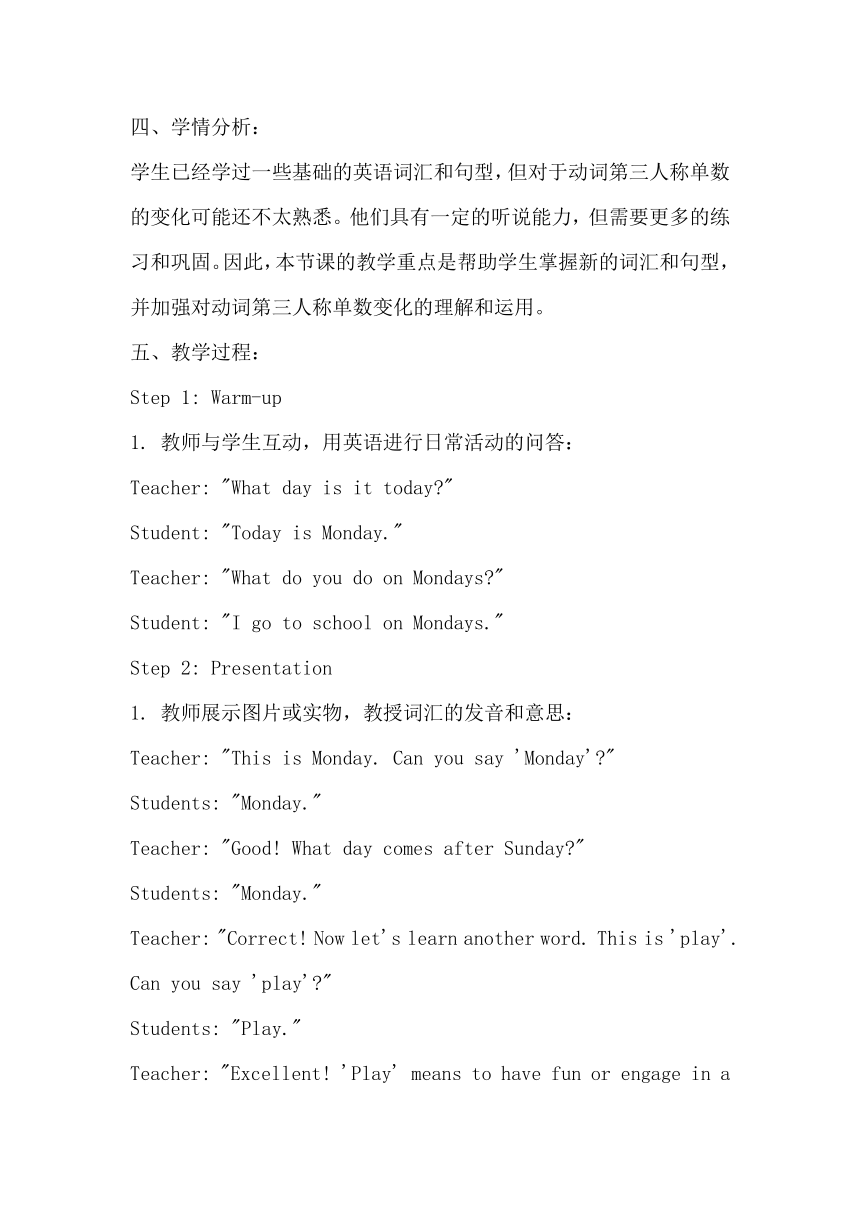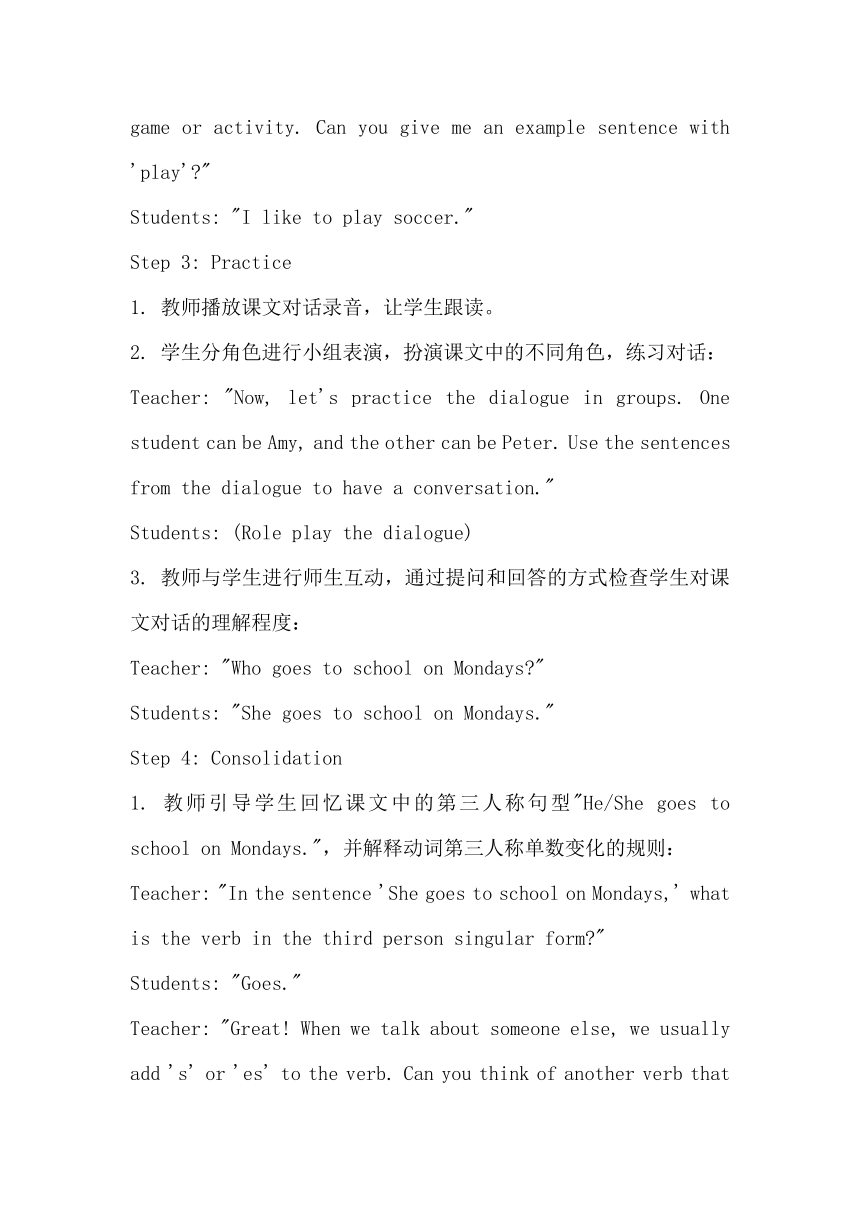Module 5 Unit 1 She goes to school on Mondays. 教案(含反思)
文档属性
| 名称 | Module 5 Unit 1 She goes to school on Mondays. 教案(含反思) |

|
|
| 格式 | docx | ||
| 文件大小 | 14.3KB | ||
| 资源类型 | 教案 | ||
| 版本资源 | 外研版(三年级起点) | ||
| 科目 | 英语 | ||
| 更新时间 | 2024-01-28 15:48:19 | ||
图片预览



文档简介
外研版三年级下册英语Module 5
《Unit 1 She goes to school on Mondays.》教案
一、教材分析:
本课是外研版三年级下册英语Module 5《Unit 1 She goes to school on Mondays.》的教材,主要围绕日常活动展开,学生将学习描述第三人称日常活动的句型"He/She goes to school on Mondays.",并学习相关的词汇和短语。通过听、说、认读,学生能够理解并运用这些句型和词汇,从而能够描述他人的日常活动。
二、教学目标:
1. 能够听、说、认读 Monday, play, friend, go to school, on the phone, at home 等单词和短语。
2. 听懂、理解课文对话大意,能够运用正确的语音语调朗读并表演对话。
3. 理解并使用句型"He/She goes to school on Mondays."谈论第三人的日常活动。
教学重难点
教学重点:
1. 理解、识记本课词汇。
2. 听说并运用句型"He/She goes to school on Mondays."
教学难点:
理解并掌握动词第三人称单数的变化: go-goes; play-plays
四、学情分析:
学生已经学过一些基础的英语词汇和句型,但对于动词第三人称单数的变化可能还不太熟悉。他们具有一定的听说能力,但需要更多的练习和巩固。因此,本节课的教学重点是帮助学生掌握新的词汇和句型,并加强对动词第三人称单数变化的理解和运用。
五、教学过程:
Step 1: Warm-up
1. 教师与学生互动,用英语进行日常活动的问答:
Teacher: "What day is it today "
Student: "Today is Monday."
Teacher: "What do you do on Mondays "
Student: "I go to school on Mondays."
Step 2: Presentation
1. 教师展示图片或实物,教授词汇的发音和意思:
Teacher: "This is Monday. Can you say 'Monday' "
Students: "Monday."
Teacher: "Good! What day comes after Sunday "
Students: "Monday."
Teacher: "Correct! Now let's learn another word. This is 'play'. Can you say 'play' "
Students: "Play."
Teacher: "Excellent! 'Play' means to have fun or engage in a game or activity. Can you give me an example sentence with 'play' "
Students: "I like to play soccer."
Step 3: Practice
1. 教师播放课文对话录音,让学生跟读。
2. 学生分角色进行小组表演,扮演课文中的不同角色,练习对话:
Teacher: "Now, let's practice the dialogue in groups. One student can be Amy, and the other can be Peter. Use the sentences from the dialogue to have a conversation."
Students: (Role play the dialogue)
3. 教师与学生进行师生互动,通过提问和回答的方式检查学生对课文对话的理解程度:
Teacher: "Who goes to school on Mondays "
Students: "She goes to school on Mondays."
Step 4: Consolidation
1. 教师引导学生回忆课文中的第三人称句型"He/She goes to school on Mondays.",并解释动词第三人称单数变化的规则:
Teacher: "In the sentence 'She goes to school on Mondays,' what is the verb in the third person singular form "
Students: "Goes."
Teacher: "Great! When we talk about someone else, we usually add 's' or 'es' to the verb. Can you think of another verb that changes in the third person singular form "
Students: "Plays."
2. 教师给学生一些练习题,要求他们根据题目中的人物和时间填写正确的句子,加强对句型的理解和运用:
Teacher: "Now, complete the sentences with the correct form of the verb in the third person singular. For example, 'She _______ to school on Tuesdays.'"
Students: "Goes."
3. 学生两两合作,用第三人称句型描述自己和伙伴在不同的日子里的活动,进行对话练习:
Teacher: "Work with your partner and use the sentence pattern 'He/She _______ on ________.' to talk about your activities on different days. Take turns asking and answering questions."
Students: (Engage in dialogues, e.g., "What does she do on Wednesdays " "She plays tennis.")
Step 5: Extension
1. 教师提供一些额外的句子模板,例如"He/She plays soccer on Saturdays.",让学生根据自己的日常活动进行创作,并与同伴分享:
Teacher: "Now, create your own sentences using the sentence pattern 'He/She _______ on ________.' and share them with your partner."
Students: (Create and share sentences, e.g., "He goes shopping on Sundays.")
2. 学生可以画出自己在不同日子里的活动,然后用句子描述,展示给全班同学:
Teacher: "Draw a picture showing your activities on different days of the week. Write sentences to describe the activities. Then, present your pictures and sentences to the class."
Students: (Draw, write sentences, and present their work.)
Step 6: Summary
1. 教师总结本节课的重点内容,包括学习的词汇和句型,以及动词第三人称单数的变化规则:
Teacher: "Today, we learned new vocabulary words like 'Monday', 'play', 'friend', 'go to school', 'on the phone', and 'at home'. We also practiced using the sentence pattern 'He/She _______ on ________.' to talk about different activities on different days. We learned that when we talk about someone else, we usually add 's' or 'es' to the verb. For example, 'She goes to school on Mondays.' Good job, everyone!"
板书设计:
Unit 1 She goes to school on Mondays.
[Monday] [play] [friend] [go to school] [on the phone] [at home]
He/She goes to school on Mondays.
七、教学反思:
本节课通过多种形式的活动,帮助学生掌握了本课的词汇和句型,并加强了对动词第三人称单数变化的理解。学生在小组表演和对话练习中积极参与,增强了他们的口语表达能力。在下节课中,可以进一步巩固所学内容,并引入更多的日常活动词汇和句型,以拓展学生的语言运用能力。
《Unit 1 She goes to school on Mondays.》教案
一、教材分析:
本课是外研版三年级下册英语Module 5《Unit 1 She goes to school on Mondays.》的教材,主要围绕日常活动展开,学生将学习描述第三人称日常活动的句型"He/She goes to school on Mondays.",并学习相关的词汇和短语。通过听、说、认读,学生能够理解并运用这些句型和词汇,从而能够描述他人的日常活动。
二、教学目标:
1. 能够听、说、认读 Monday, play, friend, go to school, on the phone, at home 等单词和短语。
2. 听懂、理解课文对话大意,能够运用正确的语音语调朗读并表演对话。
3. 理解并使用句型"He/She goes to school on Mondays."谈论第三人的日常活动。
教学重难点
教学重点:
1. 理解、识记本课词汇。
2. 听说并运用句型"He/She goes to school on Mondays."
教学难点:
理解并掌握动词第三人称单数的变化: go-goes; play-plays
四、学情分析:
学生已经学过一些基础的英语词汇和句型,但对于动词第三人称单数的变化可能还不太熟悉。他们具有一定的听说能力,但需要更多的练习和巩固。因此,本节课的教学重点是帮助学生掌握新的词汇和句型,并加强对动词第三人称单数变化的理解和运用。
五、教学过程:
Step 1: Warm-up
1. 教师与学生互动,用英语进行日常活动的问答:
Teacher: "What day is it today "
Student: "Today is Monday."
Teacher: "What do you do on Mondays "
Student: "I go to school on Mondays."
Step 2: Presentation
1. 教师展示图片或实物,教授词汇的发音和意思:
Teacher: "This is Monday. Can you say 'Monday' "
Students: "Monday."
Teacher: "Good! What day comes after Sunday "
Students: "Monday."
Teacher: "Correct! Now let's learn another word. This is 'play'. Can you say 'play' "
Students: "Play."
Teacher: "Excellent! 'Play' means to have fun or engage in a game or activity. Can you give me an example sentence with 'play' "
Students: "I like to play soccer."
Step 3: Practice
1. 教师播放课文对话录音,让学生跟读。
2. 学生分角色进行小组表演,扮演课文中的不同角色,练习对话:
Teacher: "Now, let's practice the dialogue in groups. One student can be Amy, and the other can be Peter. Use the sentences from the dialogue to have a conversation."
Students: (Role play the dialogue)
3. 教师与学生进行师生互动,通过提问和回答的方式检查学生对课文对话的理解程度:
Teacher: "Who goes to school on Mondays "
Students: "She goes to school on Mondays."
Step 4: Consolidation
1. 教师引导学生回忆课文中的第三人称句型"He/She goes to school on Mondays.",并解释动词第三人称单数变化的规则:
Teacher: "In the sentence 'She goes to school on Mondays,' what is the verb in the third person singular form "
Students: "Goes."
Teacher: "Great! When we talk about someone else, we usually add 's' or 'es' to the verb. Can you think of another verb that changes in the third person singular form "
Students: "Plays."
2. 教师给学生一些练习题,要求他们根据题目中的人物和时间填写正确的句子,加强对句型的理解和运用:
Teacher: "Now, complete the sentences with the correct form of the verb in the third person singular. For example, 'She _______ to school on Tuesdays.'"
Students: "Goes."
3. 学生两两合作,用第三人称句型描述自己和伙伴在不同的日子里的活动,进行对话练习:
Teacher: "Work with your partner and use the sentence pattern 'He/She _______ on ________.' to talk about your activities on different days. Take turns asking and answering questions."
Students: (Engage in dialogues, e.g., "What does she do on Wednesdays " "She plays tennis.")
Step 5: Extension
1. 教师提供一些额外的句子模板,例如"He/She plays soccer on Saturdays.",让学生根据自己的日常活动进行创作,并与同伴分享:
Teacher: "Now, create your own sentences using the sentence pattern 'He/She _______ on ________.' and share them with your partner."
Students: (Create and share sentences, e.g., "He goes shopping on Sundays.")
2. 学生可以画出自己在不同日子里的活动,然后用句子描述,展示给全班同学:
Teacher: "Draw a picture showing your activities on different days of the week. Write sentences to describe the activities. Then, present your pictures and sentences to the class."
Students: (Draw, write sentences, and present their work.)
Step 6: Summary
1. 教师总结本节课的重点内容,包括学习的词汇和句型,以及动词第三人称单数的变化规则:
Teacher: "Today, we learned new vocabulary words like 'Monday', 'play', 'friend', 'go to school', 'on the phone', and 'at home'. We also practiced using the sentence pattern 'He/She _______ on ________.' to talk about different activities on different days. We learned that when we talk about someone else, we usually add 's' or 'es' to the verb. For example, 'She goes to school on Mondays.' Good job, everyone!"
板书设计:
Unit 1 She goes to school on Mondays.
[Monday] [play] [friend] [go to school] [on the phone] [at home]
He/She goes to school on Mondays.
七、教学反思:
本节课通过多种形式的活动,帮助学生掌握了本课的词汇和句型,并加强了对动词第三人称单数变化的理解。学生在小组表演和对话练习中积极参与,增强了他们的口语表达能力。在下节课中,可以进一步巩固所学内容,并引入更多的日常活动词汇和句型,以拓展学生的语言运用能力。
同课章节目录
- Module 1
- Unit 1 It's the ABC song.
- Unit 2 My favourite colour is yellow.
- Module 2
- Unit 1 They are monkeys.
- Unit 2 The man is short.
- Module 3
- Unit 1 I like football.
- Unit 2 I don't like riding my bike.
- Module 4
- Unit 1 Do you like meat?
- Unit 2 Does Lingling like oranges?
- Module 5
- Unit 1 She goes to school on Mondays.
- Unit 2 Does your mum go to work on Saturdays?
- Module 6
- Unit 1 What do you do on Sundays?
- Unit 2 What does Lingling have at school?
- Module 7
- Unit 1 We fly kites in spring.
- Unit 2 It's warm today.
- Module 8
- Unit 1 It's on your desk.
- Unit 2 Daming flies a kite in the park.
- Module 9
- Unit 1 I've got a new book.
- Unit 2 Has Amy got a bike?
- Review Module
- Unit 1
- Unit 2
- Module 10
- Unit 1 Here's a red hat.
- Unit 2 She's got an orange sweater.
